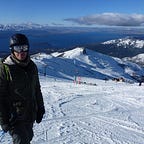Day 2 — Mastering the art of living together.
Disclaimer: I started this post some days ago. Life in the Bay is hectic. Now I am sitting in a coffee at Stanford, and wanna catch up with my computer-life that includes this blog. Pictures will be included soon.
Okay, now we all got to the Rainbow Mansion and live in a small room. Our luggage basically covers the floor so it’s even difficult to open it and get a new t-shirt. Is this a team building activity? Feels like it! On top of that, yesterday we had to make some changes with the mattresses (and if it’s not easy to walk within the room or open your bags to get some pants, how do you think moving those giant pieces of whatever-they-are-made of is?). Half of the team wanted to drop some plastic color balls all around but that’s another discussion that ended when the mattresses’ thing began.
Our first meeting was in a self driving car startup called Voyage. They are the first ones we visit that have less than 50 employees which makes it both interesting and new; basically you have the CEO and developers in the same room and can speak to both of ’em (fortunately that’s what we did). An Argentine who works there set the agenda of the whole visit making some other people of the company participate as well as the VP of finances and a Data Scientist based in Seattle who was working in the Bay Area for the week.
Right after visiting Voyage a member of the strategy team showed us the Facebook campus around. What a great place! Patissiere is an out-of-this-world thing (and free if you have a badge which makes it even better). People are definitely stimulated and even though they do not have a start up mindset, they understand that what they do has a lot of impact due to the amount of users Facebook has. It was at this point of the trip when we started to realize how the speed-size trade off works — you need to optimize those two all the time while growing and in mature stages too, and the most effective way of doing that is by building a culture that has this trade off in mind. Spoiler: food was extremely amazing.
And to make the day even better, we had dinner with Ale Resnik (go google him, let me tell you it’s worth your time), an Argentine entrepreneur who studied at ITBA too and cofounded several companies (Beepi is the last one, and now he’s working on Belong) both in Argentina and in the US. Not only he was pretty generous with his time, but also open to share his knowledge and listen to our ideas, projects, encouraging us to keep walking this path. To be honest, Ale is the kind of people that they would talk as a ‘successful entrerpeneur’ when you go to a business course and I guess it’s similar to meeting Messi; you do not how the conversation is going to be until it turns out he is a person like you and I who has been a student some years ago.
There are some lessons I like pointing out at the end of the entry, not only because it’s easier for you to read but also because sometimes they all make sense when you list them one below another. That said, here’s the list:
- POCs (proofs of concept) are useful. They force you to set the scope of the problem you are trying to solve and iterate with the real world.
- Solve a problem. Does not matter how, but make sure at least somebody is facing a situation that can be improved by what you are proposing.
- ‘Go step by step instead of trying to solve the world overnight’.
- People who are experts in a field make habits based on experience (which is ok). Keep in mind that a breeze of fresh air might contribute a new perspective on solving problems.
- What seems to be the most expensive thing in the Bay Area? 100% People.
- At least remote friendly seems to be the way2go. People need to be comfortable to be more effective. But, pay attention: regardless where your people are you gotta make them feel part of the company.
- Companies serve food to visitors.
- University is not necessarily a path to work. It helps you to grow as a human being by exposing you to some situation (stress, diversity) and forcing you to open your mind. Same for the MBA.
- Sleeping is key.
- Do not look for what you like doing. Identify where you can add more value to others, and go for it. You will improve, enjoy the process, and find others’ reactions great.
- Read Paul Graham essays.
